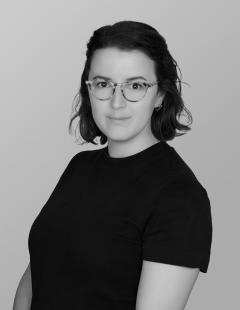Alexandra Biggs
Protection Analyst, UNRWA
Please tell us about your background
Originally from Australia, I grew up moving internationally and knew I wanted to pursue a global career of my own. Before joining ODID I worked as a management consultant, following a Bachelor of Arts (Hons) from the Australian National University. While I had a longstanding desire to work in support of refugees and internally displaced people, undertaking the MSc in Migration Studies allowed me to pivot my professional career into this sector.
Please tell us about your career since leaving ODID
Since leaving ODID, my career has taken me to Egypt, Iraq, Ukraine and now the West Bank. I have worked for both the United Nations and non-governmental organisations with a focus on humanitarian protection in forced displacement contexts. My work has centred around the protection of civilians, and I have undertaken roles across operations, advocacy, and analysis.

‘The education I received at Oxford has formed much of the theoretical and academic underpinning of my humanitarian career.’
‘The education I received at Oxford has formed much of the theoretical and academic underpinning of my humanitarian career.’
And your current job?
UNRWA is the mandated agency providing services to Palestine refugees in the Middle East. I lead our research and analysis function within the protection team, and aim to understand trends and developments as they affect UNRWA's operations and the people we serve. On any given day the work can vary, depending on an ever-changing context.
Why did you choose ODID and your course?
I was excited by the interdisciplinary approaches at ODID, and the opportunity to engage with world-leading scholars. I was attracted by the community and culture of learning at Oxford, and the support given for independent research.
How has your education at Oxford benefitted you in your career?
The education I received at Oxford has formed much of the theoretical and academic underpinning of my humanitarian career. I benefited from the rigour and challenge of tutorials, the opportunity to undertake fieldwork in support of my dissertation, and the community of support I found along the way. Four days after graduation I flew to Cairo to take up my first job supporting refugees and vulnerable migrants - a career which has since led me to roles in Erbil, Kyiv, and Jerusalem.
What did you particularly value about ODID?
The depth of ODID's expertise was phenomenal: a community of global experts undertaking first-class research into some of the most pertinent and pressing topics facing our world. I feel so lucky to have been part of this community, and to have learnt from leading minds.
What other activities were you involved with at Oxford?
During my degree, I rowed and coxed for the St Antony's College Boat Club, sang with the Oxford Bach Choir, and volunteered at the Oxford Winter Night Shelter. I was still in my rowing kit at most morning lectures!
What advice would you give to current students?
Speak to scholars you admire, chase down librarians for special book requests, and learn from all your peers. Lean in to all of the amazing opportunities that Oxford has to offer: attend guest lectures, sign up for field trips, buy a ball ticket! I gained as much outside the classroom as I did in it, including a wonderful community of lifelong friends who I go to for advice and guidance. My degree at Oxford undoubtedly broadened my horizons in ways I could not have imagined beforehand
